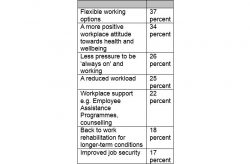Nearly a fifth (18 percent) of respondents say they’ve gone into work when feeling mentally unwell – equivalent to 5.8 million British workers. One in five (19 percent) would be more likely to go into work if mentally ill than physically ill. Paul Avis, Marketing Director at Canada Life Group Insurance, comments.
Almost a fifth of respondents (18 percent) said they’ve gone into work when feeling mentally unwell, according to new research from Canada Life Group Insurance. This is equivalent to 5.8 million UK workers, and suggests a significant stigma still persists around the issue of mental health in the workplace. A fifth (19 percent) say they’d be more likely to go into work if feeling mentally unwell than they would if feeling physically unwell, with mental health issues not deemed as severe as physical ones by a significant minority. Just 20 percent report they would take time off if they were suffering from a stress-related illness.
Many employees are worried about how their boss and colleagues would react to time off for mental health. Canada Life’s research found one in five (20 percent) would be embarrassed to say they were off with a mental health problem, while more than one in ten (13 percent) would be worried about their future job prospects if they took time off for this. 12 percent fear their boss and/or colleagues would no longer take them seriously, and the same proportion say their boss and/or colleagues’ understanding of mental health issues is poorer than of physical ones.
Improving the experience of those with mental health issues in the workplace
The research also provides insight into how employers can tackle the stigma of taking time off from the workplace for mental health issues. When asked how employers could make people with mental and physical health issues feel more comfortable taking time off, 37 percent of workers say the opportunity to work flexibly would help them.
A third (34 percent) of employees say promoting a more positive attitude to health and wellbeing would be beneficial, and a quarter (26 percent) identified less pressure to be ‘always on’ and working. This suggests that a change in workplace culture would help to reduce presenteeism.
Other measures employees say would help them feel more comfortable taking time off when they need it to recuperate include workplace support, such as Employee Assistance Programmes (22 percent) or back to work rehabilitation for longer term conditions (18 percent).
Table 1: Factors that would make employees feel more comfortable taking time off when unwell

Paul Avis, Marketing Director at Canada Life Group Insurance, comments: “Old stigmas still persist when it comes to mental health in the workplace. People suffering from mental health issues should be focusing on getting better rather than struggling into the office. You would not come into work if you were too physically unwell to do so, would you?
“Too many employees do come in when unwell as they are worried about how having a mental illness will affect their job prospects or relationship with their colleagues. Employers must do more to show they are serious about supporting employees with mental health and stress-related issues. It is important to communicate not only that it’s okay for them to take time off to get better, but also that there won’t be any negative impact on their career for doing so.
Organisations should embrace professional, quality support as many are unaware of what can be done and what support is available from insurers. Our Early Intervention Service, available with our group income protection contracts, provides day one absence reporting and management for mental health and other complex absence cases, and seeks to help employees safely back to work through proactive vocational rehabilitation. Employee Assistance Programmes are an invaluable form of support for staff with mental health concerns, particularly if they are caused or worsened by issues in the workplace such as heavy workloads. These are provided at no additional cost to use alongside group income protection policies. Having these support services in place provides practical support as well as reinforcing the message that organisations using them are serious about staff health and wellbeing.”









